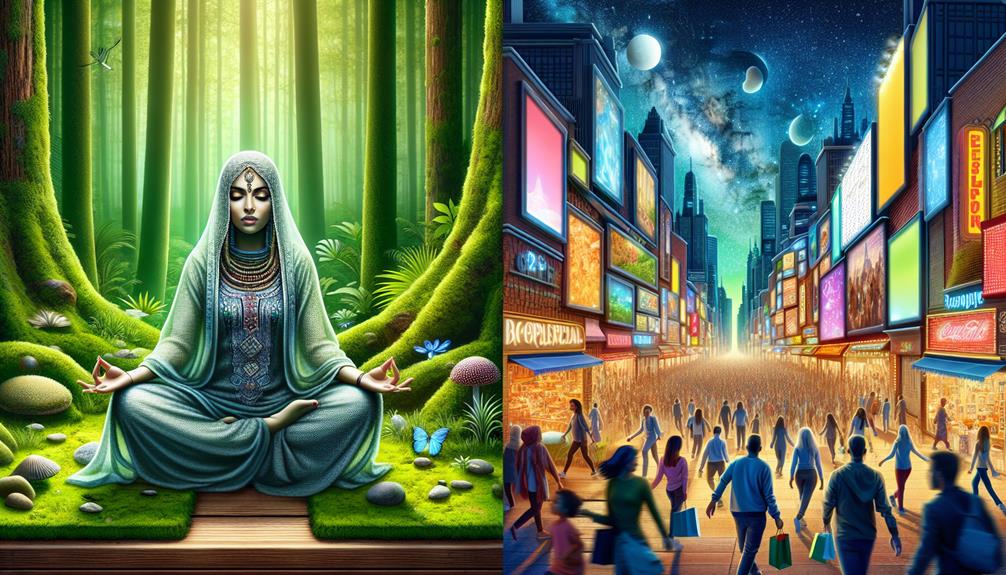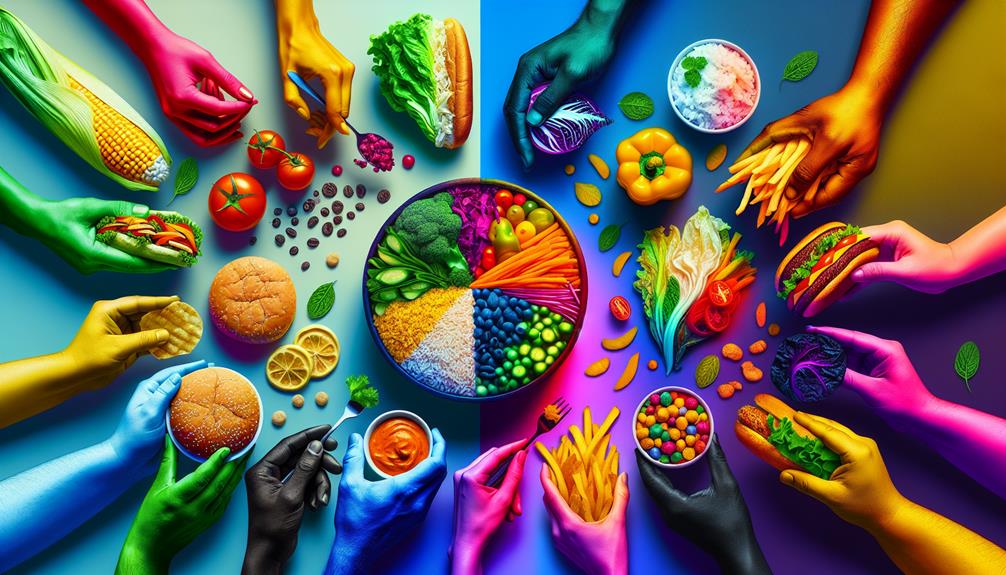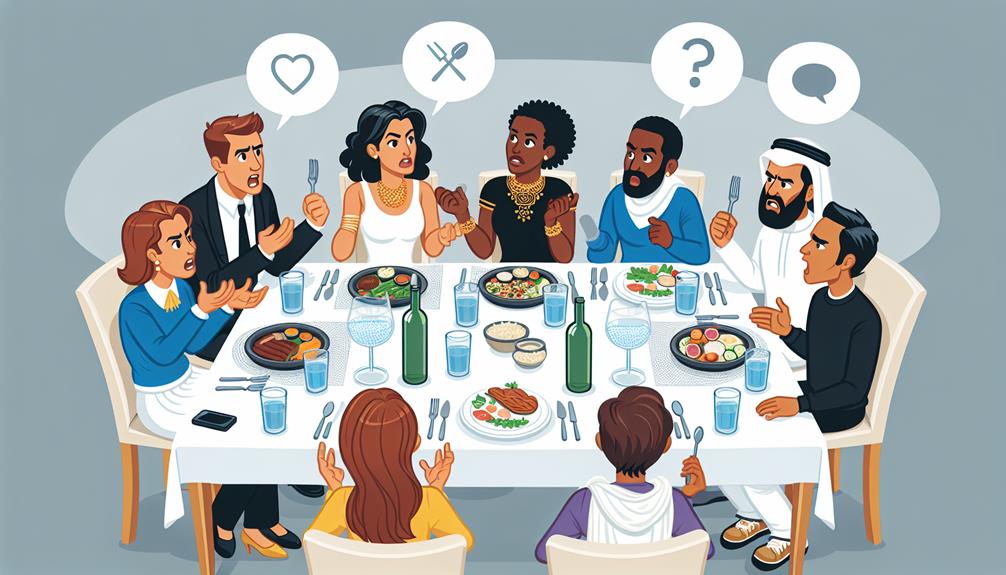As you navigate the aisles of your favorite store or scroll through endless online catalogs, you’re not just shopping; you’re engaging in a debate that has significant implications for your lifestyle and the world: whether to embrace or resist consumerism. Embracing it might seem like a celebration of innovation and abundance, providing you with the latest goods and technologies. On the other hand, resisting it encourages a critical look at personal and societal needs, potentially leading to a more sustainable and equitable world. But where do you draw the line, and what are the real costs or benefits of your choice? This question isn’t just about what you buy; it’s about what kind of world you want to live in.
Consumerism
You must understand that consumerism isn’t just about shopping; it’s a complex social and economic phenomenon that shapes how you live and what you value.
From its historical roots in early capitalist societies to its pervasive presence in today’s global economy, consumerism has evolved considerably.
Analyzing how it impacts modern society will reveal both its benefits and its profound costs.
Definition of Consumerism
Defining consumerism as merely the pursuit of new goods and services oversimplifies a complex social and economic phenomenon that shapes our choices and lifestyles. At its core, consumerism isn’t just about acquiring items; it’s a cultural orientation that encourages the continual buying of commodities and services. This drive is fueled by the promise that happiness and success can be bought, often driven by sophisticated marketing strategies that you’re exposed to daily.
You’re not just buying a product; you’re often sold a lifestyle or an identity. Consumerism intertwines with global economies, influencing labor markets and even international relationships. It dictates how resources are allocated and who benefits from production processes. The environmental impact is also significant, as the demand for newer and faster products perpetuates cycles of production and waste that strain our planet.
Critically, this relentless consumption shifts your focus from community-based values and sustainable living to individual gratification and material wealth. It’s essential to understand that consumerism isn’t merely a personal choice but a pervasive part of the global economic system. By recognizing this, you can see the broader implications of your consumption patterns, beyond the immediate satisfaction of acquiring new possessions.
Historical Evolution of Consumerism
You’ve likely observed how the Industrial Revolution marks a pivotal point in the history of consumerism.
This era didn’t just bring about technological advancements; it radically transformed how you interact with products and perceive needs.
Impact of Industrial Revolution
The Industrial Revolution dramatically amplified consumerism by transforming production processes and market accessibility. It shifted society from agrarian economies to urban centers dominated by factories. This change made goods cheaper and more available, fostering a culture of consumption that you’re part of today.
However, this shift also led to environmental degradation and worker exploitation, which are critical issues that need addressing in your consumer choices.
Consumerism in Modern Society
Many people find themselves entangled in the ever-expanding web of consumerism that characterizes modern society. You’re constantly bombarded with messages urging you to buy more, upgrade, and stay on trend. It’s not just about fulfilling needs anymore; it’s about incessant wants. This relentless pursuit to consume doesn’t just strain your wallet; it also has profound implications for the environment and social structures.
You’re living in an age where tech giants and fashion moguls dictate trends that change at lightning speed. This creates a vicious cycle of buying and discarding, which not only depletes natural resources but also increases waste. The environmental costs are staggering, yet they’re often hidden behind the gloss of sleek marketing campaigns.
Moreover, this consumption-driven culture fosters inequality. While you indulge in the latest gadgets, millions struggle to meet basic needs. It’s a stark disparity, fueled by a system that values profit over people.
It’s crucial to step back and critically assess your consumption habits. Are you buying because you need to, or because you’ve been conditioned to believe that newer is always better? Rethinking your choices can be a powerful act of resistance against a system that thrives on your unending desire to consume.
Effects of Consumerism
You might notice that while consumerism bolsters economic growth by increasing demand and production, it simultaneously inflicts severe damage on our environment through resource depletion and pollution.
This dual impact forces you to ponder whether the short-term economic benefits justify the long-term ecological costs.
Analyzing these contrasting effects helps you understand the complex dynamics and trade-offs involved in consumerist practices.
Positive Effects on Economy
Positive Effects on Economy
Consumerism greatly boosts economic growth by driving demand for products and services. When you actively participate in the market, buying the latest gadgets, fashion, or even everyday goods, you’re not just filling your home with new items, you’re also fueling the economy. This relentless demand leads to more production, which in turn requires more jobs. Yet, it’s important to critically analyze how this cycle affects the broader economic landscape.
Here are three pivotal ways through which consumerism positively impacts the economy:
- Job Creation: Every product you purchase has gone through various hands—designers, manufacturers, marketers, and retailers. Increased consumer spending helps sustain and create jobs across these diverse sectors.
- Innovation and Diversity: High consumer demand encourages companies to innovate and diversify their products to stand out in the competitive market. This innovation not only leads to better products but also stimulates healthy competition which can lead to more choices for you.
- Economic Stability: By maintaining a consistent demand for goods and services, consumerism can lead to a more stable economy. Fluctuations are minimized and economic growth becomes more predictable, providing a semblance of security to businesses and investors alike.
While these benefits are significant, they’re part of a larger economic narrative that requires a balanced view to fully understand consumerism’s role in modern economies.
Negative Effects on Environment
As you consider the broader impacts of consumerism, it’s essential to recognize how your consumption patterns fuel waste generation and pollution. Each purchase you make has a ripple effect, often leading to increased waste that our planet can’t sustainably manage.
This cycle not only degrades natural ecosystems but also amplifies the challenges in mitigating climate change.
Waste Generation and Pollution
Consumerism’s relentless demand drives the production of goods that result in significant waste generation and environmental pollution.
Here’s how it impacts you:
- Resource Depletion: You’re witnessing rapid consumption of finite resources, risking future shortages.
- Chemical Runoff: Industries discharge pollutants into your water and air, compromising your health.
- Landfill Overflow: Excessive waste creation leads to overflowing landfills, encroaching on natural habitats.
Consumerism in Media
You’ve likely noticed how advertising strategies permeate every facet of media, subtly shaping your preferences and choices. These tactics aren’t just about selling products; they deeply influence pop culture and, by extension, societal values.
As you engage with various media, consider how these commercial forces are at play, steering both consumption patterns and cultural norms.
Advertising Strategies
Advertising strategies in media skillfully manipulate consumer behavior by crafting messages that resonate deeply with personal desires and societal trends. When you flip through a magazine, watch TV, or scroll through social media, you’re not just encountering random ads. You’re experiencing carefully engineered appeals aimed at influencing not just your buying decisions, but also your perceptions of necessity and desire.
Here’s how you’re being targeted:
- Emotional Appeal: Advertisers use emotional triggers such as happiness, fear, or even nostalgia to create a strong association between you and the product. This isn’t about the product’s utility but how it makes you feel.
- Targeted Messaging: Thanks to data analytics, ads are more personalized than ever. You get advertisements that seem to speak directly to you, tapping into your demographics, browsing history, and purchasing habits.
- Urgency and Scarcity: These strategies create a sense of immediacy, pushing you to act quickly. Phrases like ‘limited time offer’ or ‘while supplies last’ prompt you to make swift decisions, often bypassing rational judgment.
As you navigate through your daily media consumption, it’s vital to be aware of these strategies. They’re not just selling a product; they’re crafting your consumer identity. Recognize this, and you empower yourself to make more informed choices, resisting manipulative tactics.
Influence on Pop Culture
As you examine the role of celebrity endorsements in media, it’s important to recognize how these endorsements manipulate consumer desires and expectations.
Celebrities don’t just sell products; they sell lifestyles and ideals that may not be attainable for the average person.
This disparity between the marketed image and achievable reality can profoundly impact societal values and individual self-esteem.
Celebrity Endorsements
Celebrity endorsements greatly shape consumer preferences and trends within pop culture, leveraging their wide appeal and influence. You witness this daily, but it’s important to critically assess the impact:
- Authenticity Dilution: Celebrities often promote products they don’t use, potentially misleading you about the quality.
- Oversaturation: Every other ad features a star, which can desensitize you to genuine product benefits.
- Economic Disparity: High-end products endorsed by celebrities mightn’t be affordable, alienating average consumers.
Consumerism Articles and Critiques
You’ve likely encountered a range of articles either praising or condemning consumer culture, yet the depth of analysis can vary greatly.
When examining critiques on overconsumption, consider not just the arguments’ emotional appeal, but the empirical evidence supporting them.
It’s essential to discern whether these critiques provide actionable insights or merely echo familiar concerns.
Analysis of Popular Consumerism Articles
Diving into popular consumerism articles reveals a pattern of persuasive tactics that often prioritize profit over genuine consumer needs. You’ll notice that the language used is designed to evoke emotions rather than inform. This strategy manipulates you into making purchases under the guise of improving your lifestyle or status.
Additionally, these articles frequently partner with influential brands, which may compromise their credibility due to a clear conflict of interest.
Here’s what you should look for when reading these pieces:
- Emotional Language: Check for words that aim to trigger feelings of fear, urgency, or exclusivity. These are red flags that suggest the article is more about selling than informing.
- Brand Mentions: Notice how often a product or brand is mentioned. Frequent references might indicate a sponsored article or hidden advertising, skewing the objectivity of the information provided.
- Data and Sources: Look for the presence of verifiable data or credible sources. A lack of these can mean the content is more opinion than fact, designed to persuade rather than educate.
Critiques on Overconsumption
As you explore the critiques on overconsumption, consider how articles often highlight the urgent need for sustainable alternatives.
You’ll find that these critiques not only question the viability of current consumer habits but also push for a broader adoption of practices that respect environmental limits.
It’s important to examine how effectively these alternatives are presented and whether they truly offer a feasible path away from consumerism’s pitfalls.
Sustainable Alternatives for Consumers
In the face of rampant consumerism, exploring sustainable alternatives that mitigate environmental impact and promote ethical consumption is crucial. Here’s how you can start:
- Opt for Products with Minimal Packaging:
Reduces waste and energy consumption.
- Support Local and Ethical Brands:
Enhances local economies and reduces transportation emissions.
- Choose Reusable Over Single-Use:
Minimizes plastic waste and promotes resource efficiency.




